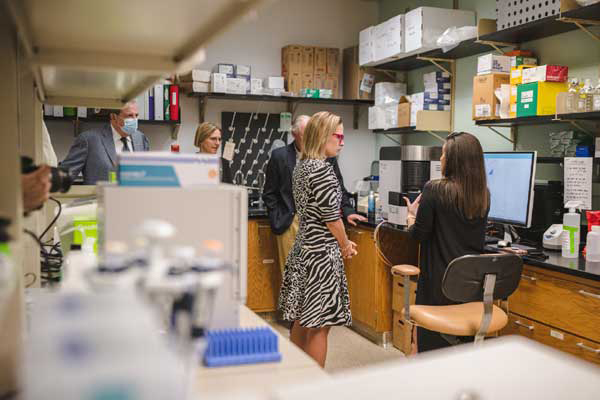Contributed article
TUCSON – Arizona senior Senator Kyrsten Sinema visited the University of Arizona Cancer Center to tour the campus and hold a roundtable with the center’s leadership and researchers. Sinema’s visit follows her success in bringing together the entire bipartisan Arizona congressional delegation in a letter of support for the Cancer Center, securing renewal of its designation as a National Cancer Institute (NCI) Comprehensive Cancer Center.
“The University of Arizona leads groundbreaking research to help further our understanding of cancer. I’m glad to visit the UArizona Cancer Center to see their critical work firsthand and discuss ways we can continue partnering to support their research into treatments and cures, and improve the quality of life for Arizonans diagnosed with cancer,” said Sinema.
Earlier this year, when the UArizona Cancer Center’s NCI designation was up for renewal, Sinema successfully led the entire bipartisan Arizona congressional delegation in a letter to the National Cancer Institute and the National Institutes of Health to underscore the importance of the Cancer Center to Arizona. The Sinema-led delegation letter helped secure critical funding totaling $3,597,804 for the Cancer Center to continue conducting groundbreaking research and care.
Sinema received a tour of the UArizona Cancer Center to see firsthand how funds from the renewed Cancer Center Support Grant will advance innovative research to better understand, prevent, and treat cancer.
Following the roundtable, Sinema presented the UArizona Cancer Center with a copy of her Senate-passed bipartisan resolution designating July 20, 2022 as Glioblastoma Awareness Day. Each year, Sinema leads a bipartisan effort establishing Glioblastoma Awareness Day nationwide, calling for greater efforts to advance treatments for brain cancers, and honoring the legacy of the late Arizona senior Senator John McCain and others impacted by brain tumors.
The UArizona Cancer Center is part of the NCI network of cancer centers, and is the only NCI-Designated Comprehensive Cancer Center headquartered in and serving the entire state of Arizona.
The UArizona Cancer Center has three established scientific research programs that work together to accomplish the center’s mission to prevent and cure cancer, including Cancer Biology, Cancer Prevention and Control, and Clinical and Translational Oncology. The center is a leader in research on women’s cancers, men’s cancers, gastrointestinal cancers, head and neck cancers, lymphoma, and skin cancers.









.jpg)